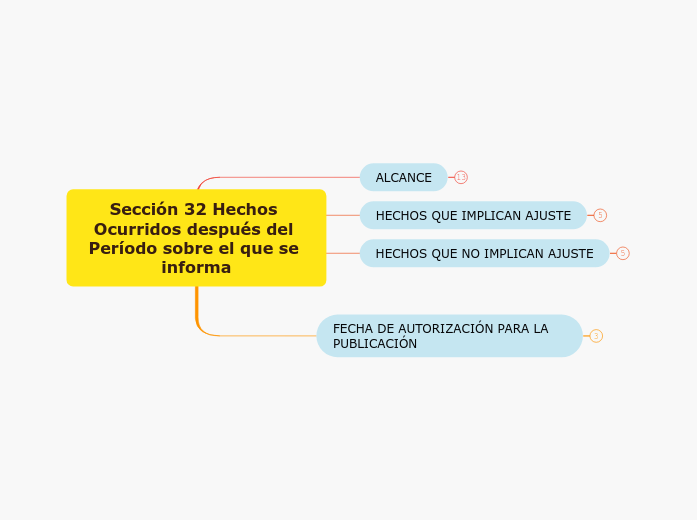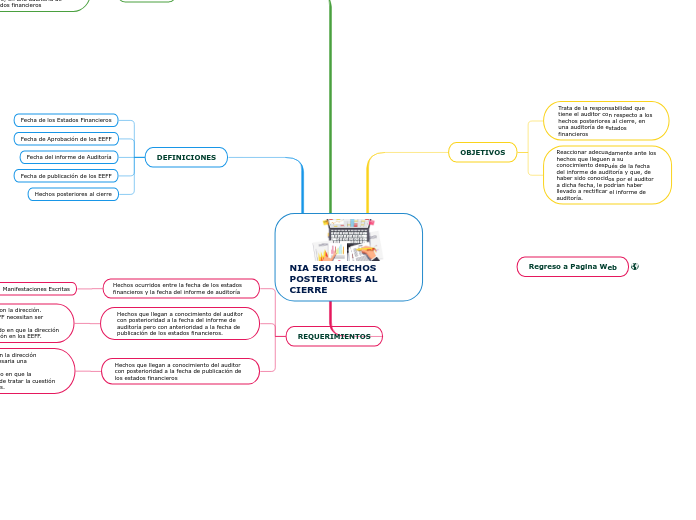Sección 32 Hechos Ocurridos después del Período sobre el que se informa
To name your story, you have to think about the overall message and what you want your audience to understand from the story. Also, make it relevant and easy to remember.
FECHA DE AUTORIZACIÓN PARA LA PUBLICACIÓN
Revelará
Si los propietarios tienen poder para modificar los EEFF después de su publicación
Fecha en que los EEFF han sido autorizados para su publicación y quien autorizo
HECHOS QUE NO IMPLICAN AJUSTE
The ending of a story is essential. We all know that if the ending is weak, what happened before loses its importance. So make it unpredictable, but fair. A resolved ending answers all the questions and ties up any loose threads from the plot.
Dividendos
This is the closure section of the story.
See examples of possible outcomes below:
- all problems have been solved
- it's clear how each one of your characters ends up
- your main character is transformed by the challenge
Si se acuerda distribuir dividendos a los tenedores de sus instrumentos de patrimonio después del período s/informa, no se reconocerán como pasivo al final del período sobre el que se informa
Try answering these questions to come up with a closure:
- Have all the problems been solved?
- Is there a clear picture of what happens with each character in the story?
- Has the challenge transformed your main character?
- How do the characters feel in the end?
Revelará la siguiente información
This is the moment when the main character surpasses the last obstacle and finally faces their greatest challenge.
The climax usually follows one of these patterns:
- realization
- resolution
- choice
Type in your answer.
Estimación de sus efectos financieros o si no se pudiese una explicación de ello
Naturaleza del hecho
HECHOS QUE IMPLICAN AJUSTE
The middle of the story is where you add layers of complications that will lead to the end. Reveal more about the character's journey. Did their personality go through changes? How did they overcome the challenges? And as you build up the story’s central conflict, make it more personal to that character. Also, from the middle act, you have to lead into the final act.
Determinación del costo de activos adquiridos o el importe por activos vendidos antes del final del período sobre el que se informa
There wouldn't be any tension and excitement in your story if there weren't any obstacles in your character's way.
Información que indique el deterioro del valor de un activo o el importe de una pérdida por deterioro del valor
Your character(s) need(s) motivation in order to solve the challenge(s).
El valor al final del período sobre el que se informa
Why does your character need to confront this challenge? What does he/she expect to accomplish by solving it?
See a few examples:
- will marry in 3 days
- can fix the mistakes of the past
Resolución de un litigio judicial
Each story has a main character and that character usually needs to solve a problem or challenge. The character's challenge is the one that creates tension throughout the story.
Confirma que la entidad tenía una obligación presente al final del período sobre el que se informa
In most stories, there are 3 challenges. The number 3 is a mystical number symbolizing completeness. Try to come up with interesting challenges with which your character needs to struggle.
See a few examples below:
- turns into a werewolf at night
- is sent back in time
ALCANCE
In the beginning of the story (or the exposition), you will need to introduce the setting and characters. You might also want to introduce the main conflict. This part of the story is important because it gives the reader necessary background information and maybe even a first insight into a character’s personality.
Establecer principios para el reconocimiento, medición y revelación de los hechos
The setting (time & place) of a story can change throughout the plot.
RECONOCIMIENTO
The time of the story can also change. It can describe the event of a single day or can include an entire year's plot. Anyway, don't forget to mention it.
Incluye información a revelar relacionada para
Hechos que impliquen ajuste y hayan ocurrido después del período sobre el que se informa
Se ajustarán los importes reconocidos en sus EEFF
TIPOS DE HECHOS
Your story can take place wherever your imagination will take you to.
For example: in an elevator, in an enchanted forest, etc. Don't forget to give details of the environment each time the setting changes, otherwise, the story can be confusing. Also, mention the seasons as each of them has unique weather and events.
Los que indican condiciones que surgieron después del período sobre el que se informa
Los que proporcionan evidencia de las condiciones que existían al final del período sobre el que se informa
Definir los hechos ocurridos después del periodo sobre el que se informa
Characters are essential to a good story. Usually, the protagonist(s) is/are the most affected by the plot. Introduce a character by focusing on their actions, interests, and occupation, as the physical appearance doesn't make a difference in most cases.
DEFINICIÓN
Type in the name of your character.
Son todos los hechos, favorables o desfavorables que se han producido entre:
Choose the type of your chacter:
Protagonist (main character)Antagonist (main character's opponent)Flat (stereotypical character)Round (his/ her personality develops throughout the story)Static (doesn't evolve as a person throughout the story)Dynamic (dramatical change in personality)Confidant (the main character trusts him/ her)Foil (contrasting character who enhances the personality of another character)Other
Fecha de autorización de los EEFF para su publicación
El final del período sobre el que se informa










